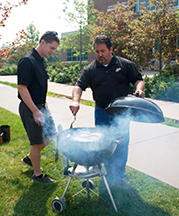Purdue graduate creates startup to produce, sell charcoal made from coffee grounds, creating a greener, faster way to grill
October 21, 2014
 |
|
Coffee Coals CEO Rich Bruins, from left, and Greg Deason, vice president of the Purdue Foundry, grill food using briquettes made from compressed coffee grounds. The Coffee Coals technology makes the grilling briquettes rigid, allowing the blocks to heat faster and maintain heat longer than conventional briquettes creating a cleaner, faster way to cook. (Purdue Research Foundation photo) Download Photo |
WEST LAFAYATTE, Ind. – A Purdue University alumnus has developed a faster, more environmentally friendly way to grill food this tailgating season by using coffee briquettes made from coffee grounds.
"The coffee briquettes can be used the same way traditional charcoal briquettes are used and with the same smoky, charcoal taste but with a unique aromatic smell," said Rich Bruins, a Purdue mechanical engineering graduate and founder and CEO of a company called Coffee Coals Inc.
The Coffee Coals technology makes the charcoal briquettes rigid, allowing the coal to heat faster and maintain heat longer than conventional briquettes.
"Two pounds of Coffee Coals can burn at a cooking temperature of 350-400 degrees for 60 minutes and only take five to eight minutes to heat up," he said. "Everything we use is all-natural, like potassium and magnesium, and safe, so it presents no health risks to the user. Regular charcoal can contain petrochemicals, synthetic binders and or additives."
The product was market tested in Sunspot Natural Market in West Lafayette, Indiana, and D & R Market in Lafayette, Indiana, both health food stores. The product proved so popular that Bruins is gearing up to expand the market base to serve other locations through the assistance of the Kickstarter program, a global crowd funding platform based in the United States that helps entrepreneurs develop their startups.
"The Purdue Foundry helped me greatly with starting my business. Now I am beginning the Kickstarter program and my goal is to use the funds to increase my production capacity and sell Coffee Coals in other outlets," he said. "I have until Nov. 12 to raise $23,500 in funding through Kickstarter. Both this program and the guidance I received from the Purdue Foundry are a tremendous help."
Bruins, who worked at the Purdue Christian Campus House for two years, developed the technology of using coffee grounds to grill food while preparing a team of student engineers to help with clean water efforts in Guatemala.
"In my two years at Campus House, we were encouraged to use our skills to help others, and I was given the freedom to combine my love of engineering with my passion for ministry," Bruins said. "When I served in Guatemala, I led a team of students to a Guatemalan coffee farm to implement a biomass press. The biomass press compressed biological and agriculture waste material into dense briquettes that burn hotter and more efficiently than loosely piled brush. The locals were able to use these briquettes to cook their food and boil their water to rid it of any pathogens."
This project helped inspire Bruins to do the same with coffee ground waste in the United States.
About Purdue Foundry
The Purdue Foundry is an entrepreneurship and commercialization hub in Discovery Park's Burton D. Morgan Center for Entrepreneurship whose professionals help Purdue innovators create startups. The Purdue Foundry is managed by the Purdue Research Foundation, which received the 2014 Incubator Network of the Year by the National Business Incubation Association for its work in entrepreneurship. For more information about funding and investment opportunities in startups based on a Purdue innovation, contact the Purdue Foundry at foundry@prf.org
About Coffee Coals
Coffee Coals converts waste coffee grounds into charcoal briquettes. The charcoal briquettes ignite quicker, are all natural and provide the user an opportunity to grill in an environmentally friendly way. The customer also has an energy-dense source of charcoal but no longer has to be concerned about their food containing deposits of petrochemical or synthetic binders that may happen with traditional charcoal.
Writer: Hillary Henry, 765-588-3586, HKHenry@prf.org
Purdue Research Foundation contact: Cynthia Sequin, 765-588-3340, casequin@prf.org
Source: Rich Bruins, 812-454-3086, richbruins@gmail.com

